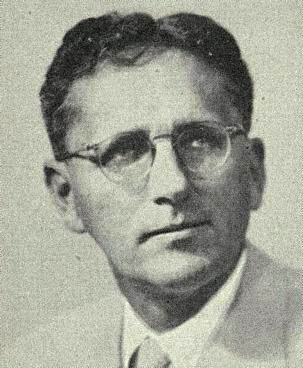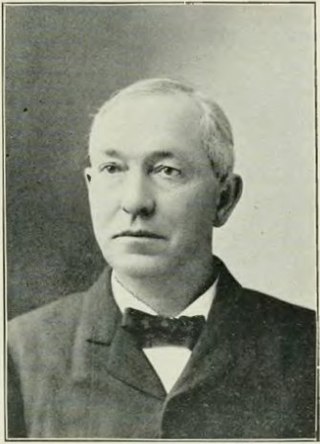Related Research Articles

Frederic René Coudert Jr. was a member of the United States House of Representatives from New York from 1947 to 1959, and a member of the New York State Senate from 1939 to 1946. Prior to serving in Congress, he was best known for his role with New York's Rapp-Coudert Committee, which attempted to identify the extent of communist influence in the state of New York's public education system. The committee's inquiries lead to the dismissal of more than 40 instructors and staff members at the City College of New York, actions the committee's critics regarded as a political "witch-hunt."

Champion Spalding Chase was an American lawyer, politician, and pioneer of Wisconsin and Nebraska. He was the first Attorney General of Nebraska and served seven years as mayor of Omaha, Nebraska. He also served two years in the Wisconsin Senate, representing Racine County, Wisconsin, and served as a Union Army officer during the American Civil War. His name was sometimes abbreviated as C. S. Chase. He was a first cousin of U.S. Supreme Court chief justice Salmon P. Chase.

John Mansfield was an American lawyer and Republican politician. He was the 15th lieutenant governor of California. During the American Civil War, he was a Union Army officer serving in the 2nd Wisconsin Infantry Regiment in the famous Iron Brigade of the Army of the Potomac. He took command of the regiment during the first day of the Battle of Gettysburg and remained in command until the regiment was disbanded in the fall of 1864. After the war, he received an honorary brevet to brigadier general.

John James Jenkins was an English American immigrant, lawyer, judge, and Republican politician. He served seven terms as a member of the United States House of Representatives, representing northwest Wisconsin, and served one year as United States district judge for the District of Puerto Rico.

Florian Lampert Jr. was an American businessman and progressive Republican politician from Oshkosh, Wisconsin. He was a member of the U.S. House of Representatives for nearly 12 years, representing Wisconsin's 6th congressional district from December 1918 until his death in 1930. Earlier in his career, he served as sheriff of Winnebago County, Wisconsin.

George Douglas Perkins was a longtime newspaper editor, Republican U.S. Representative from Iowa's 11th congressional district in the northwestern portion of the state, and a candidate for his party's nomination as governor.

Ormsby Brunson Thomas was an American lawyer, Republican politician, and Wisconsin pioneer. He was a member of the United States House of Representatives for three terms (1885–1891), representing Wisconsin's 7th congressional district. He also served five years in the Wisconsin Legislature and 13 years as district attorney of Crawford County, Wisconsin.

Michael Griffin was an Irish American immigrant, lawyer, and Republican politician. He was a member of the United States House of Representatives, representing western Wisconsin from 1894 to 1899. He also served two years in the Wisconsin Senate and one year in the State Assembly. As a young man, he served as a Union Army officer through nearly the entire American Civil War.
Hans Bertel Warner was a Norwegian American immigrant, farmer, and Republican politician. He was the 12th Secretary of State of Wisconsin and served four years in the Wisconsin State Senate, representing Eau Claire, Pepin, and Pierce counties.
Melvin Withington Perry was an American businessman and Republican politician from Kewaunee County, Wisconsin. He was a member of the Wisconsin Senate, representing Wisconsin's 1st State Senate district from 1911 through 1919. His name was almost always abbreviated as M. W. Perry.

Adam Gale Malloy was an Irish American immigrant and Republican politician who served as a Union Army officer during the American Civil War. After the war, he was given an honorary brevet to brigadier general. He was an unsuccessful candidate for the United States House of Representatives from Texas in 1892.
Norman Leslie James was an American farmer, merchant, and Republican politician. He was a member of the Wisconsin State Senate and State Assembly, representing Richland County. His brother David G. James also served in the Wisconsin Senate, representing the same district.
Norman Alfred Knudson was an American businessman and Republican politician. He was a member of the Wisconsin State Senate from 1899 through 1902, representing Manitowoc and Calumet counties.

Satterlee Clark was an American attorney, Democratic politician, and Wisconsin pioneer. He served ten years in the Wisconsin State Senate (1862–1872), representing eastern Dodge County, and also served two years in the Wisconsin State Assembly. He wrote a historical essay of his memories of Fort Winnebago and the Black Hawk War in pre-statehood Wisconsin. In his lifetime, he was widely known by the nickname Sat Clark.
Argalus Waldo Starks was an American farmer, politician, and Wisconsin pioneer. He served as the 3rd State Prison Commissioner of Wisconsin and later served 6 years in the Wisconsin Legislature, representing Sauk County.

Jesse Arthur Clason was an American physician from Neosho, Wisconsin who served a single term as a member of the Wisconsin State Assembly from Dodge County; he was elected as a Gold Democrat.
Bennett U. Strong was an American businessman, Republican politician, and the first settler at Spring Green, Wisconsin. He served two years in the Wisconsin State Senate, representing Sauk County.
John Day Putnam Sr. was an American miller and Democratic politician, and Wisconsin pioneer. He was the 2nd mayor of River Falls, Wisconsin, and represented Pierce County for one term in the Wisconsin State Assembly, during the 1883 term.
William George Bissell was a member of the Wisconsin State Senate.
John Gillespie was a Scottish American immigrant, farmer, and Republican politician. He served two terms in the Wisconsin State Assembly, representing Sauk County.
References
- 1 2 3 4 5 6 Casson, Henry, ed. (1895). "Biographical Sketches" (PDF). The Blue Book of the State of Wisconsin (Report). State of Wisconsin. pp. 670–671. Retrieved May 18, 2022.
- ↑ "Forty-Second Regiment Infantry". Roster of Wisconsin Volunteers, War of the Rebellion, 1861–1865. Office of the Adjutant General of Wisconsin. 1886. p. 715 . Retrieved May 18, 2022.
- 1 2 Cunningham, Thomas J., ed. (1891). "Biographical Sketches" (PDF). The Blue Book of the State of Wisconsin (Report). State of Wisconsin. p. 601. Retrieved May 18, 2022.
- ↑ "Held Two Conventions". Portage Daily Register. August 16, 1898. p. 4. Retrieved May 18, 2022– via Newspapers.com.
- ↑ "Not a Nomination". Wisconsin State Journal . October 1, 1898. p. 1. Retrieved May 18, 2022– via Newspapers.com.
- ↑ "W. G. Bissell Chosen". Portage Daily Democrat. October 27, 1898. p. 1. Retrieved May 18, 2022– via Newspapers.com.
- ↑ "Conger Quits". The Chattanooga News. October 25, 1906. p. 3. Retrieved May 18, 2022– via Newspapers.com.
- ↑ "Wood Alcohol Blinds". The Watertown News. April 12, 1907. p. 6. Retrieved May 18, 2022.
- ↑ "To Probate Will". Los Angeles Times . December 14, 1918. p. 11. Retrieved May 18, 2022– via Newspapers.com.
- ↑ "Senator Conger Dies in West". Baraboo Weekly News. November 28, 1918. p. 6. Retrieved May 18, 2022– via NewspaperArchive.